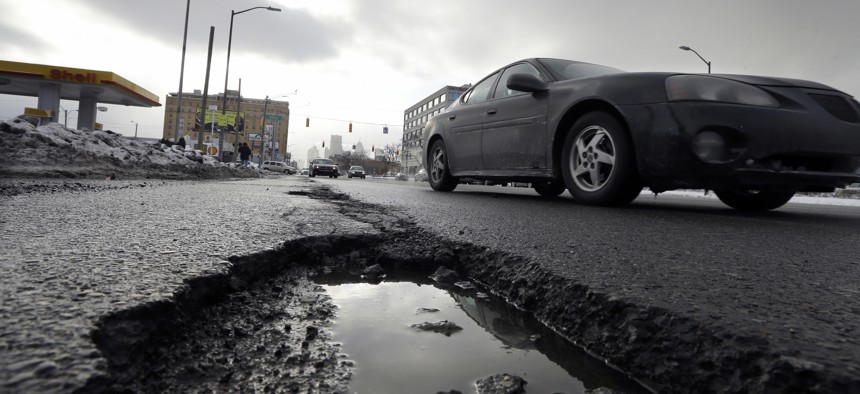How the Infrastructure Proposal Would Fund Roads, Bridges and Public Transit


Connecting state and local government leaders
The proposal puts $150 billion in new funding toward surface transportation and transit, but won’t close the backlog in maintenance and capital costs.
Update: The Senate released the 2,700-page bipartisan infrastructure bill Sunday night. The text of the bill can be found here.
The bipartisan infrastructure package working its way through the Senate will provide nearly $150 billion in new surface transportation and transit funding, part of a broader $1.2 trillion plan the White House has called a “once-in-a-generation investment.”
While the investment would rank among the largest in transportation infrastructure in the nation’s history, experts say it will not uniformly close the gap in funding needed to address structural deficiencies.
Public transit systems, for example, have a $176 billion backlog in funding, according to a report by the American Society of Civil Engineers. The infrastructure package would provide $39 billion in funding for transit over five years. That’s $10 billion less for public transit than was initially proposed in the initial infrastructure framework.
But in addition to money allocated through an extension of the FAST Act, the infrastructure proposal would boost federal transit funding by 83%, said Maria Lehman, president elect of ASCE.
“It’s not close to the need, but it is so much more than what is being spent now that it becomes a more realistic number,” she said.
Bridges and roads face similarly bleak funding backlogs, which nearly total $800 billion, according to ASCE. Bridges account for about $125 billion in capital investment backlogs.
Of the nation’s more than 617,000 bridges, 42% are at least 50 years old and around 7% are considered structurally deficient. Current spending on bridge rehab totals about $14.4 billion annually, but to address the backlog, annual spending should be closer to $23 billion, Lehman said.
Out of $110 billion allocated for roads and bridges, the infrastructure package would dedicate $37 billion toward competitive bridge grant programs, which would be used to help pay for the repair and replacement of deficient and outdated bridges. That would raise bridge spending to about $22 billion a year— “really close to where we need to be on a regular basis,” Lehman said.
The package would also provide at least $15 billion in competitive grants for surface transportation projects, according to a summary of the proposal that was provided to reporters
Transportation Secretary Pete Buttigieg trumpeted the “historic” investments this week, saying the money constituted “the biggest dedicated investment in bridges since the Eisenhower administration, when they set up the interstate highway system in the first place.”
The infrastructure bill, the details of which are still being drafted, is expected to cost roughly $1.2 trillion over eight years with around $550 billion in new spending.
The Senate took the next step toward consideration of the infrastructure proposal on Friday, voting to proceed with the amendment process. The text of the legislation has not been released, and amendments are not expected to be considered until the finalized deal is released.
"We may need the weekend, we may vote on several amendments, but with the cooperation of our Republican colleagues I believe we can finish the bipartisan infrastructure bill in a matter of days,” Sen. Majority Leader Chuck Schumer said Friday.
Funding Backlogs or Future Projects
State and local governments spend far and away more money than the federal government on the upkeep and expansion of the national highway network, so the infusion of federal dollars will be extremely useful, said Joseph Schofer, a professor of civil and environmental engineering at Northwestern University.
With the influx of money, state and local governments will have a chance to invest in transformational infrastructure projects, he said. But they will have to grapple with whether their transportation infrastructure plans merely address funding backlogs or if they take future transit and transportation needs into account.
“Do you build for today, yesterday with the backlog, or do you try to look ahead and build for tomorrow?” Schofer said.
During the pandemic, for instance, traffic congestion declined in many metropolitan areas as residents remotely worked or attended school. To develop a forward-looking plan, transportation officials may want to better understand the long-term effects that increased remote work has on traffic patterns before committing funding to highway expansion projects, he said.
Many public transit agencies also experienced a huge drop in ridership—and revenues—during the coronavirus pandemic. That’s led some critics to question whether investment in public transit agencies is wasteful.
Under the proposal, Metropolitan Transportation Authority, which operates New York City’s subway and bus system, would stand to receive a significant portion of the funding allocated for transit, the New York Times reported. The MTA would receive about $11 billion, taken from a combination of $50 billion authorized through the FAST Act and the $39 billion in new spending, Sen. Schumer told the Times.
Andrea Noble is a staff correspondent with Route Fifty.

NEXT STORY: What the evolution of AI/ML means for government IT


